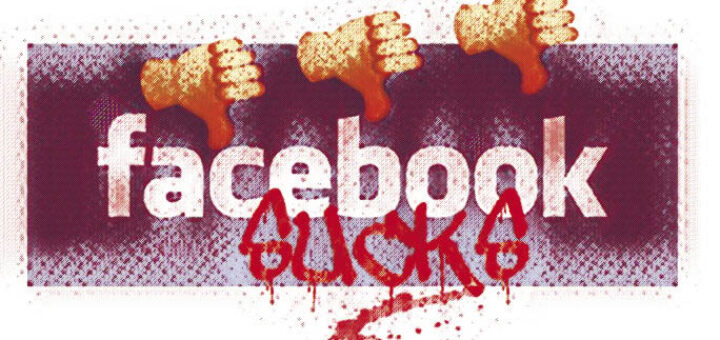Opinion: I’m in an abusive relationship with Facebook

By Ed Ghost, Staff Writer
On Feb. 4, 2004, some random guy named Mark Zuckerberg launched “The Facebook” — a small social media platform created with the intent to connect Harvard students with one another. There were also unconfirmed internet rumblings that Facebook was originally a creepy ploy for Zuckerberg to have girls from his school sign up so that he could use it as his own personal dating pool.
Fast forward to Sept. 26, 2006, Zuckerberg had ditched Harvard, moved to California and had started running his social media dynasty full time. Now anyone over 13 years of age could get themselves an account — though the website really only took off in 2007, which is the year that I joined.
In 2007, I was an edgy high school graduate who didn’t really see much value in having a social media account. But I still succumbed when I realized that everyone I knew no longer used MSN Messenger, but relied on texts and posting on each other’s Facebook “walls” as the new main form of communication.
Gone were the days of memorizing addresses and phone numbers, I had to get hip to be with the times. Back then, the internet was the Wild West, and pretty rudimentary. YouTube videos had only existed for two years at this point, and everyone carried an actual camera when they wanted to take photos. Back then, cellphone pictures had the same quality as a photo taken by a potato.
Facebook initially was okay, I guess.
It didn’t have the HTML or music embedding customization that Myspace did, and it wasn’t filled with people who matched my demographic like Nexopia, but more people seemed to be using Facebook exclusively. To this day, Facebook is the only social media website that every generation of my family has, and knows how to use — and it’s free, so that’s a good thing, right?
There’s a saying that goes, “if you’re not being sold something, then you’re the one being sold,” and Facebook is no different. Hell, Facebook might be the best at gathering and selling your information these days next to Google.
They even go so far as to require a “real” name. I resisted it for years until they locked me out of my account and demanded that I show them a government-issued piece of ID to prove my name on there was real — which I photoshopped, by the way, Sucker-berg.
In August of 2012, a study came out saying that there are an estimated 83 million fake accounts on Facebook. This revelation alone made Facebook’s share price drop below $20 because it became harder to keep track of people without legitimate information.
It’s no secret that the money Facebook makes is by advertising. Whether it’s customized to you and your interests, or if it’s one of those bizarre ads we all get from Wish from time to time. The dollar bills come from attracting and working with advertisers.
That being said, being hounded with advertisements is a tale as old as media itself — magazines, radios and television have been doing it for decades.
So why am I mad at Facebook?
It seems like they are just playing the same corporate game that everyone else does, right? We all need to make money.
Facebook always grinds my gears. The first thing that drew my ire was the “female nipple” rule. No lady nipples, ever.
Trying to feed your baby and maybe bring some awareness about breastfeeding? Get the heck off the platform, and cop a 30-day ban for good measure.
Do you want to post Titian’s 1534 painting the “Venus of Urbino?” Don’t you dare — it’ll be removed.
Facebook has a very strong opinion on “graphic nudity,” and any depiction of lady nipples, be it for art or for science is unacceptable. They have recently said that under certain context, nipples are acceptable, but seem to be having trouble keeping up with that promise.
So why, for 14 years now, have I been able to post any image of a penis on the platform without fear? With the exception of an actual person’s genitals, I have posted art, memes, sex toys, and visual jokes of the male genitalia for almost half of my life. I have been banned from Facebook more times than I can count, but it’s never been because I’ve posted a “peen.”
On the same topic of nipples, Facebook offers no less than 58 different gender customizations. There is no shortage of identifiers to make us queer folk feel seen — so, why aren’t we treated as our gender?
Facebook seems to only use a binary formula to hand out bans. If you’re a pre-op trans man or a non-binary individual who feels comfortable being topless but Facebook decides you fit the cis-female narrative in appearance, you’ll be flagged. This is regardless of the presence of your gender marker — seems pretty performative to me.
Facebook is meant to be addictive. They even have a whole team who monitors how long you go on their website, and how to keep you on it for as long as possible. The longer you stay on the platform at a time, the easier it is to know your habits and your interests. They want you to consume, consume and consume.
Facebook is fake-news central. Anyone can say anything and claim it’s a fact with almost no repercussions, and it goes way further than your 83-year-old aunt with the whacky opinions. Facebook’s lack of accountability has created horrendous human rights violations, including genocide and other death-related incidents.
We’re all just guinea pigs in Facebook-land. In 2012, Facebook sparked outrage when it was revealed that it was doing psychological experiments on its users without consent. Facebook removed either all positive or all negative posts from users’ news feeds to see how it would affect their moods.
Speaking of moods, using Facebook also leads to higher rates of depression in people. Most people see only what others want them to see. As a result, they feel like they’re not good enough, or happy enough or successful enough compared to their peers—though to be fair this isn’t just a Facebook thing.
I can sincerely write a novel of all the unsavoury things Facebook has done, but this article can only fit so much.
So why don’t I just leave Facebook?
No one is forcing me to stay. Oh, I’ve tried to leave! I’ve tried. But like I said before, I’ve been on Facebook for over half my life now. Most of my teenage years and all of my time as an adult thus far has been documented on the platform.
There is no better digital memorial than social media.
I can go back to conversations I’ve had with loved ones that happened decades ago and re-read them. Every photo I’ve ever taken since I was 18 is stored on Facebook. And, more importantly, the words and lives of some of the people that I love who have passed away, are on Facebook. I can even connect with others who also miss them on Facebook.
I hate to admit it, but there are some people in my life that I would have nothing to remember them by, if it were not for their profiles.
My mother, father, cousins and other family members are all on Facebook. It’s the only place where every one of them has an account. Neither of my parents are on any other form of social media, and the convenience of being able to catch up with them and see what they find interesting enough to post and share with the world is just too good.
Facebook allows me to talk for free with people I know around the world. If I were to text my friend Jack in the UK, it would cost one of us money for every text we sent.
Facebook also gives you the creepy, but also comforting, ability to check up on people you like without being forced into a conversation to catch up. I know it’s bad, but sometimes you don’t have the mental spoons or time to reach out. Being able to see posts is a great way to keep up-to-date, press a like button to show that you care, and go on with your day.
There’s no other platform like it.
Facebook has a little bit of everything. You can video chat, text, share pictures, find pages and groups with specific interests, catch up on the news and more. It’s right there in your pocket or on your computer, whenever you want it.
It’s like an abusive relationship.
The highs are high, and the lows have dire consequences, but until we collectively as a society decide to move on to the next “big thing”, Facebook is here to stay. It has us all in its clutches and there isn’t much we can do about it as individuals if we want to stay up to date with the rest of society, and it sucks.



